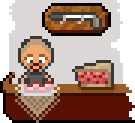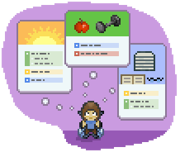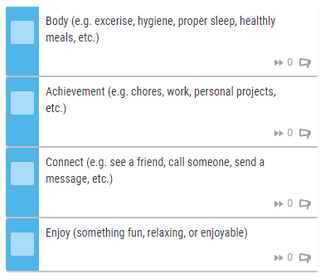 |
This page contains one or more outdated guild links.
Guilds and the Tavern were removed from Habitica on August 8, 2023. If you know the status of the guild(s) mentioned in this page, please update their links and remove the template |
Are you feeling suicidal or worried you might harm yourself or someone else? Seek immediate help by contacting a suicide hotline.

One of the hardest things about mental illness is that no matter how talented and capable we are, depression and anxiety can make it very difficult to care for ourselves, or just to get through the basics of everyday life. For example, you might be a literal rocket scientist and still have trouble remembering to take your medication. Or not even be able to leave the bed from the heaviness of your sadness. Players who are experiencing anxiety and depression are mostly dealing with even finding the energy to finish dailies such as "eat three meals a day", "take a shower", "leave the house", or "think of something I like about myself". They feel no longer motivated to complete them, and in the worst-case, it can result in a player leaving Habitica.
As with any other task, Habitica can provide extra support to help manage the things that seem unmanageable. On this page, you'll find many forms of help, from suggested habits to challenges, to guilds of like-minded folks. It is important to remember that what works for one person won't necessarily work for another, and your personal level of success with these methods will vary. The only thing that truly matters is that you don't give up on yourself.
Warning[]
The information contained on this wiki and Habitica is not intended as, and is not, a substitute for professional medical or psychological advice. If you are feeling suicidal or are worried you might harm yourself or someone else, you should seek immediate help by doing the following:
- Go to your nearest emergency room, or
- Call a suicide hotline.
The national hotline in the US is 1-800-273-TALK (8255). Here is a list of state-by-state numbers and international numbers. Another list of updated international suicide prevention hotlines, chats, and organizations can be found here.
If you don't feel able to talk aloud about this, you can chat online with trained volunteers at I'm Alive, and if you aren't in immediate danger of acting on your thoughts, the Samaritans provide support from trained volunteers over email. If you don't feel ready to talk to anyone just yet, this page explains why your suicidal feelings aren't your fault and don't make you a bad person, and this page provides multiple actions you can take now to help yourself. You may also find the Black Ribbon guild helpful; they are dedicated to suicide and self-harm prevention. However, in an emergency, please call your emergency number or the suicide prevention hotline.
Starting Small[]
Mental illness can sap away all of your energy, making it difficult to accomplish anything and leading to feelings of frustration and helplessness. While it's impossible to "just snap out of it", you have the power to improve, regardless of the severity and persistence of your illness.
The key to achieving tangible, long-term improvements is, counter-intuitively, to make many small changes instead of large, dramatic ones. Small changes are easier to wrap your head around and easier to accomplish; with each small change you successfully implement, you'll gain confidence and motivation, increasing your ability to make additional small changes. Over time, these small changes add up, slowly but surely pushing you closer to where you want to be, and further from where you currently are. Eventually, you'll look back and realize that all your small changes have added up to large ones, achieving what can't be done by trying to fix everything at once.
You might want to make use of some of the strategies for players who can't do tasks reliably on Dailies—especially when starting out.
Taking Care of Yourself[]
The first step in this process is learning how to take care of yourself. When you are at your worst, it can be difficult to muster the energy to do even basic things, such as eating or bathing regularly. Improving your self-care is essential to being able to tackle larger problems. In other words, taking care of yourself is the foundation of your journey to self-sufficiency and happiness. But where to start? There are many examples provided below. Regardless of what change you choose to try, it's important that you do it on a regular schedule, to increase the effect it has on your habits. Remember, when starting out, focus on changing only one thing at a time, even if you would like to improve all of these areas. Once you feel you have one change under control, add another, and once you have both under control, add another, and so on.
Sleep[]
Not enough and/or low-quality sleep degrades your mental health, making proper sleep an essential part of your recovery. These are some small changes that can help you improve your sleeping:
- Set a time to go to bed or wake up every morning. You don't need to set these simultaneously; it is perfectly valid to start by changing just one, and then changing the other after the first has been mastered.
- Have a set time every night that you stop using digital screens. If you find it difficult to resist the urge, remove all screens from your room at a set time every night.
- Read a good book. There are many different articles about the benefits of reading before bed, especially in place of using electronics.
- Learn how to meditate. Meditation can be a very effective way to help calm the mind and body.
Hygiene[]
Keeping yourself clean keeps you healthy, which feeds back into your mental health. You can:
- Brush and floss your teeth once a day (twice a day if you can manage)
- Take a quick shower each day or every other day. Or if that's too difficult, wash your face and armpits with a damp washcloth.
The Make it through the day challenge from The Basics guild may be helpful here.
Exercise[]
Don't worry, you don't need to start by running a marathon! Just getting yourself moving a little bit, to begin with, can make a big difference. Try to get outside at least once a day, even if it's just standing in the doorway. If you're feeling up for it, take a short walk for five minutes, or just to the end of the block. You can also:
- Take the stairs instead of the elevator.
- Intentionally park in spots far from the entrance to a building.
- Stand up and stretch for a minute or so every hour.
- Practice standing on one foot. There has been a lot of study about the benefits of balance related exercises.
The Exercise challenge from The Basics guild may be helpful here.
Diet[]
Eating unhealthily (or not enough) has a negative effect on your physical health, which leads to a negative effect on your mental health.
- If you eat too much, replace some of your unhealthy snacks with healthier ones, such as your favorite fruit or nuts.
- If you don't eat enough, commit to eating at least one full meal each day.
The FOOD challenge may be helpful for those with eating disorders involving under-eating and the Eat Right! or 3 Meals a Day challenges may be helpful for people trying to ensure they eat three meals a day.
Medication[]
If you have medication prescribed (be it on a regular dose, taken when needed, or both), taking this promptly can make a huge difference to your health. But it can be difficult with mental health conditions, especially if the medication has side effects.
- If you have medication that is taken when needed, it helps to notice sooner rather than later that you need it. Creating a Habit can encourage this behavior.
- For regular medication, you may want to have one (or more) Dailies to encourage you to take medication regularly.
The Take your meds! challenge may be helpful here.
Social Contact[]
It is very easy to become isolated when you struggle with anxiety and depression. Trying to make sure you have at least some social contact each day, even if it's online, can be valuable in combating this.
Again, what's important is that you make one change, and commit to doing it every day. The easiest way to do that in Habitica is to create a Daily for the change you're trying to make. Additionally, you can join The Basics guild, which is full of Habiticans struggling with the same issues and helping each other. You may also find help in the Mentally Ill guild. You may find some relatively simple challenges helpful such as the Critical Goals and Healthy Mental Habits challenge from the Black Ribbon Guild.
Mental Health Habits[]
Another option is to tackle your problems more directly, and try to consciously change how you think. There are many methods to do this, some of which are listed below.
Gratitude[]
When depressed, it's easy to think that there is nothing good about your life. To combat this, at the end of each day, list three things that you are grateful for, or three good things that happened that day. This may be difficult at first but, over time, you'll improve. Taking the time for self-reflection and gratitude can improve your outlook on life, increasing your level of self-satisfaction and lowering the effects of anxiety and depression. Witnessing someone else's gratitude, such as by reading a list of things someone is grateful for or listening to an anecdote with a grateful message, can feel encouraging and help you think of your own lists and stories. The Good Things Today guild is dedicated to this and has a supportive environment. You may also find the Achieve, Accomplish, Aspire guild helpful; it is similar to the Good Things Today guild and runs a monthly challenge based on posting 2 things completed and 1 goal for tomorrow each day.
Another method that can be used in Habitica to increase your gratitude is the Happy List Challenge. The challenge is simple: just make a list of ten things that make you happy, then do at least one thing on the list every day. There should be a focus on small, achievable things, but you can include some big ones as well. To make it easier to complete at least one thing every day, see if you can make at least half of them cost little to no money. If you're having trouble thinking of a good list, you can head over to the Happy List Guild to see others' lists and receive help constructing yours.
You might also find it helpful to keep an inspiration book (physical or electronic) of positive and inspiring things. If so, the Distress Tolerance: Inspiration Book challenge from the Mastering Emotions (DBT Skills) guild may be helpful.
Meditation[]
Meditation isn't just for Buddhists; it can help calm anyone's mind, and it doesn't need to be the same for different people. There are lots of resources on meditation including the Mindfulness and Relaxation guild and its challenges. Taking the time and space to meditate (either as a regular Daily or as a Habit) can help clear your mind and help you become more grounded in the moment. It can be especially helpful if you notice warning signs of an attack of anxiety or depression. Meditation can be a form of stress management.
The Mastering Emotions (DBT Skills) guild focuses on meditation and techniques within dialectical behavior therapy including challenges on Deep Breathing and Calming Breaths.
Living with Anxiety/Depression[]
This section is aimed at those who have some control, but are still greatly distressed/affected by their anxiety or depression, and would like to learn methods for better managing these.
Management Methods[]
Here are some of the ways you can use Habitica to help manage and gain control of your conditions drawing on well-studied techniques to help manage and, in time, reduce the effects of mental health conditions. It is by no means an exhaustive list so please do add ideas that you have found useful.
Daily Mental Health Goals[]

Setting daily mental health goals can be valuable. Habitica has many challenges designed to help you set these goals.
- The The BACE Method for Self-Care challenge includes four self-care Dailies: looking after your body; achieving something (remember that these don't need to be big, sometimes having a shower is an achievement!); making social connections with others; and finding something relaxing or enjoyable (even if you can't fully enjoy it). "The BACE method for self-care is designed to help reduce vulnerability to negative thoughts and feelings. By completing at least one thing from each category every day, you become better equipped to deal with your mental illness."
- The Self-Care challenge has a Daily to help you learn to check your personal limits and some Habits to encourage self-soothing. "Sometimes we need to learn to soothe ourselves and moderate our emotions."
- The Critical Goals and Healthy Mental Habits challenge includes multiple tasks designed to reward basic achievements and foster mindfulness. "These are a few simple (but important!) goals aimed at helping you maintain a healthier state of mind, and rewarding you for positive mental health habits. Feel free to take this challenge on as a whole, or if all of it is too much for you, you can join and quit the challenge, keep the tasks and delete the individual ones you don't want."
Changing Negative Thought Patterns[]
Negative thought patterns can be overwhelming and can be hard to combat, especially when you are so used to them that you don't notice them starting. Habits and challenges can be valuable tools for changing negative thought patterns. You can use Habits and challenges to combat negative thought patterns by noticing them sooner, gaining early warning signs and insight into what is fueling these thoughts, and eventually replacing them with affirming thoughts.
Habits are great for self-directed improvement, but with challenges you have the option of peer support, especially as part of a guild.
Changing Negative Actions[]
The Habit Loop can lead to negative actions becoming entrenched, repetitive, and challenging to combat. However, using rewards through Habitica can help use that loop to change these habits. Not doing negative actions can be a positive habit that can be balanced with a negative habit for when you do take that action.
There are challenges linked to combating negative actions including the monthly BFRB Beating challenge for beating Body-Focused Repetitive Behaviors such as nail-biting, hair pulling, and skin picking run by The BFRB Guild.
Building on the Basics[]
As you continue to live with anxiety/depression you will need to ensure you still work on the basics of sleep, hygiene, exercise, diet, and medication. The Basic Depression Management challenge covers many of these.
Guilds[]
Trying to change the habits associated with anxiety and depression can be difficult to do on your own. Fortunately, there are multiple guilds with users dedicated to supporting each other's efforts to change.
- The Mentally Ill guild offers a place for all mentally ill Habiticans to share ideas and support each other.
- The Black Ribbon guild is dedicated to suicide and self-harm prevention.
- The Anxiety Alliance guild is a place for people with all types of anxiety to talk about their experiences and support each other.
- The Therapy Homework guild helps people with mental illnesses (whether they are currently in therapy or not) support each other with mental health goals.
- The Basics guild has a load of simple challenges aimed at helping you conquer basic tasks.
- The Mastering Emotions (DBT Skills) guild focuses on techniques of relaxation and distress tolerance coming from dialectical behavior therapy.
More information, as well as a longer list of guilds, is available in the Guilds Guide.
Sharing Experiences[]
Sharing experiences can be valuable both for yourself and others, providing inspiration and ideas on how to use Habitica to fight mental illness.
- Through guilds: As your mental health improves you may be able to support those in recovery with ideas and experiences through the guilds mentioned above. You may also want to join guilds that are less heavily focused on mental health such as The Chronic Illness Guild for more general support for people living with any chronic illness including mental illness.
- Editing this page: Please do edit this page with habits you found useful, challenges which you found valuable or any other ideas that might be useful to include.
Useful Links[]
Habitica Wiki Links[]
External Links[]
These sites have helped other Habiticans dealing with anxiety and depression. Your mileage may vary.
- Dealing with Depression
- The simple secrets to happiness - Turns out a better life rests on habits
- Six Habits of Happiness (PDF)
- 6 Practical and Powerful Ways to Overcome Depression
- How to Structure Your Days if You're Depressed
- Coming Back From a Setback
- 7 Habits of Incredibly Happy People
- Six Simple Habits That Defeat Anxiety
- The Habits of Happiness
- The National Alliance on Mental Illness
- 20 Things to Remember When You Think You’re Not Good Enough

